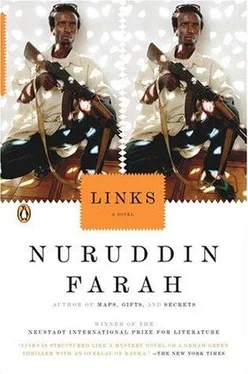“What are you saying?”
“It’s time you left,” Seamus said.
“It is, but I won’t leave yet.”
“What’s holding you back?”
“Some unfinished business awaits my attention.”
“I hope you know what you’re doing!” Seamus told him.
In response, Jeebleh took refuge in a Somali wisdom about a man who bit the stronger of two fighting dogs on the ear in anger, because it was molesting the weaker one, torturing it. He added: “I’ve already made a name for myself, haven’t I, standing up to my clan family?”
“For goodness sake,” Seamus pleaded, “they tried to murder you.”
“I won’t risk my life unnecessarily, I promise!”
Seamus ignored the promise. “It makes me sad to think that you’ll not only become part of the civil war story, but get totally lost in it, because the story is much bigger than you, and might prove deadlier than you can imagine. My only advice is that if you won’t quit, you watch out and make sure you aren’t sucked into the vortex.”
“I’ll be very careful,” Jeebleh said.
Seamus tried to steady his look before speaking. His arms folded across his chest, his manner ponderous, he said, “I’ve been there too at the crossroads, where arrivals meet departures, and where self-doubt meets with certainties and self-recrimination. And I’ve avoided becoming part of the story!”
Jeebleh now watched Seamus busy himself with some domestic chore or other, acknowledging silently that he could’ve left without trying to tie the necessary loose ends. Now this was impossible. If he left, he would be walking away from a part of himself — and leaving behind a piece of his history too. He didn’t want to do that.
“For years now,” Seamus was saying, “people have been coming to Somalia, every one of them intending to do their bit and then leave. The Americans came, as their then president put it, to do God’s work! God knows they didn’t do that. But then, did they just leave as they had planned? No, they were drawn into the vortices of clan intrigues, and when they left, they left parts of themselves behind. Making a choice and then acting on that decision and leaving: these are out of our hands before we’re aware of where we are.”
Jeebleh asked, “Why have you stayed?”
“Sometime during my second visit,” Seamus said, “I realized that I’d mislaid something of myself here during my first visit, and I had to return for it. Instead of retrieving it and leaving immediately, I’ve stayed. It’s possible that some of us cannot help losing ourselves in the sorrows of other people’s stories. I can vouch that you’ve changed since your visit to Shanta’s, I can see that. If you asked what Somalia is to me, having stayed, I would respond that it is the Ireland of my exiled neurosis.”
“My story cast in misanthropy!” Jeebleh said.
“You’re doing whatever it is you’re doing out of empathy, not hate,” Seamus suggested. “You feel deep love for justice. I’m moved to hear you tell the story of the man who bit the stronger of the two dogs. After all, there isn’t much of a story in ‘dog bites man,’ because it happens all the time. But when a man bites a dog for reasons to do with justice, it’s a big story, worthy of a newspaper headline. So could you explain to me, in the light of all this, why you’ve returned to your country in its hour of tragedy? I’ve been told that you’ve come to visit your mother’s grave. But you’ve done bugger-all about that ! So what made you come?”
Jeebleh reached inside his mind for the strength he sensed he now lacked, and found himself in a corridor as narrow as tunnels are dark. He tried to locate the arrows that might point to an exit, but there were none. His hands in front of him, he fumbled forward, and finally fell back on a version he had rehearsed to himself several times before. Retelling it for Seamus’s benefit, he described his unpleasant brush with death, when a Somali, new to New York and driving a taxi illegally, nearly ran him over. He conjured it all like a film shot on a busy New York street, demonstrating the startled look on the face of the Somali, and revisiting his own days recovering in a hospital. He slowed down to prepare himself for a challenge from Seamus, well aware that his friend could argue that by coming to Mogadiscio, he was not so much thinking about his mortality as seeking out death.
“Have you come to court death, then?” Seamus asked.
“It’s no longer clear why I’ve come,” he said.
“Would you be ready to bite the stronger of two dogs on its ear, in anger, as the Somali wisdom has it?”
Jeebleh assured him that he would.
“Are you prepared to kill and to be killed?”
“I could be, depending.”
“On what?”
“What’s at stake.”
Apropos a question not asked, Seamus said, “The violence that’s war, combined with the violence that’s famine, run in my blood and in the veins of my memory, and so I understand where you’re coming from, and where you find yourself.”
Agitated, he took his drawing pad and traced a half-human, half-animal figure, a man of advanced age, supporting himself on a walking stick and begging. Then he drew the figure of a woman à la Matisse, strong lines, prominently Fauvist in their pursuit of self-release. Jeebleh knew that Seamus would continue drawing until he provided the woman with a singularly abundant breast. And if he was in the mood, he would draw a baby, whom the woman would suckle. He would grow calm only when the drawing was done, and once the baby wore the capricious expression of a cynic.
Jeebleh put this down to Seamus’s childhood terrors: a grenade had been thrown into the window of his family’s living room, killing Seamus’s father, his sister, and two brothers — everyone but Seamus and his mother; in frequent childhood nightmares, Seamus would wake from his sleep, shouting, “But why me?” He would talk expansively about the incident, but not about the fact that the man alleged to have thrown the grenade had later died violently himself. At being asked pointed questions about this, Seamus would drop into a depressive silence. After regaining his tongue, he might tell you that although he had been in the area when the man died, he hadn’t been charged, and that the police had cleared his name within a few days, for lack of evidence.
But Jeebleh risked asking about it. He felt he had to hear about it. “If you didn’t have a hand in the man’s death, and I’ll assume that to be the case,” Jeebleh said, “why were you accused of it? How was it that your presence in the area had been noted and you were suspected?”
“Because no one living in a country in which a civil war is raging is deemed to be innocent. Here in Somalia too everyone is potentially guilty, and may be accused unfairly of crimes they’ve committed only by association. If you are a member of the same clan family as a perpetrator of a crime, then you’re guilty, aren’t you?”
“Do you still wake up, shouting ‘Why me’?”
“Not anymore I don’t,” Seamus said.
“That’s a relief!”
“Living in Mogadiscio, seeing so much devastation and death from the civil war, and working at The Refuge have cured me of that.”
Jeebleh had heard the passion in Seamus’s voice when he spoke of Raasta. He obviously adored her, as though she were his own child. His affection seemed to border on obsession. That morning Jeebleh had seen Seamus’s room in the apartment. There were photographs of the girl everywhere, on the walls, on key rings. Two photographs that he had taken hung on either side of his bed. In addition, he had many drawings of Raasta, stacks and stacks of them. Seamus was apparently in the habit of drawing her when he was nervous, which was a great deal of the time, and he drew rather competently, at times almost like a professional. “She gives a purpose to my continued stay in Mogadiscio, despite the risks,” he said now.
Читать дальше












